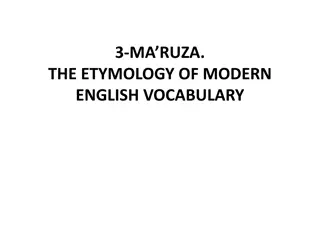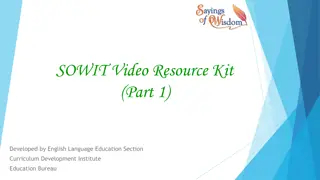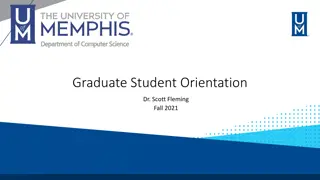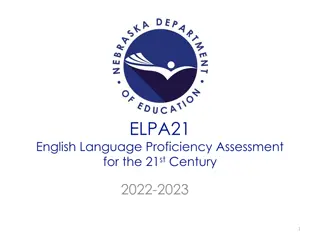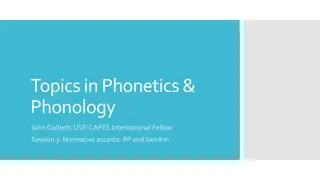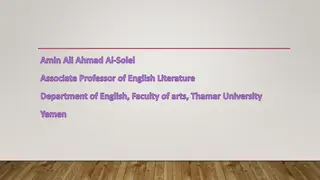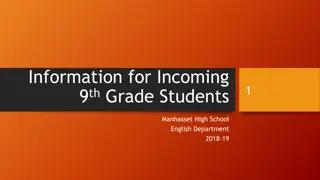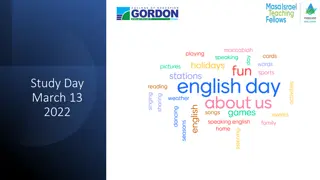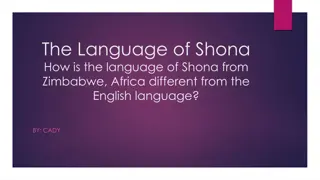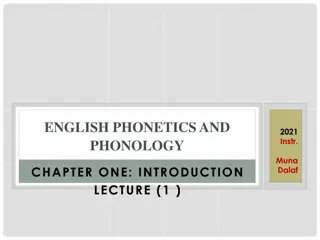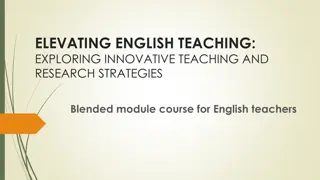ENGLISH DEPARTMENT
This overview covers the GCSE Language & Literature curriculum, examination details, support skills, exam papers, writing tasks, and more for a thorough understanding of the subject. It includes information on assessments, teaching methods, homework strategies, exam techniques, and interventions provided in the English department led by Mrs. Cunningham, Mrs. Edwards, and Ms. McParland.
Download Presentation

Please find below an Image/Link to download the presentation.
The content on the website is provided AS IS for your information and personal use only. It may not be sold, licensed, or shared on other websites without obtaining consent from the author.If you encounter any issues during the download, it is possible that the publisher has removed the file from their server.
You are allowed to download the files provided on this website for personal or commercial use, subject to the condition that they are used lawfully. All files are the property of their respective owners.
The content on the website is provided AS IS for your information and personal use only. It may not be sold, licensed, or shared on other websites without obtaining consent from the author.
E N D
Presentation Transcript
ENGLISH DEPARTMENT Mrs Cunningham (Curriculum Leader) Mrs Edwards & Ms McParland (Deputy Curriculum Leaders)
GCSE Language & Literature Core subject 2 GCSE certificates Challenging specification AQA exam board Both 100% examinations at the end of Year 11 There will be grades from 9-1 Untiered Language- 2 papers - no change to exams for 2021 Literature- 2 papers- changes to exams for 2021 N.B. The requirement for the filming of the Endorsement of Spoken Language has been removed for this cohort. This means that they will not need to do an individual filmed presentation (September 2020). Please note they will still need to present a topic in front of the teacher and this is marked and sent to the exam board. This task will be done during normal lesson times.
Class Support Skills independent research, questioning, variety of teaching styles, model answers, collaborative and individual planning Exam techniques including acronyms, timing, shadow tests WTM Walking Talking Mocks and timed assessments. Homework- e.g. learning key terms & quotations, use of GCSE pod and directed to quality revision websites and podcasts. DIRT Directed Improvement Reflection Time with mark schemes. SE & SPaG- Standard English Spelling lists, Punctuation & Grammar. 5-A-Day- regular low stakes quizzes incorporating questions from across the four papers. Word of the Week- methodical teaching of ambitious, challenging vocabulary which can be utilised in extended written pieces. Planned weekly revision. Opportunity to purchase recommended revision guides. Intervention- including English 20 cohort and English forms
English Language Exam Paper 1: Explorations in Creative Reading & Writing 1hr 45 mins (50%) Section A: Reading (25%) One literature fiction text Section B: Writing (25%) Descriptive or narrative writing (including an image- example on the next slide) Extended writing
Image result for google image beach Section B :Unseen Poetry
Writing Task Write a description suggested by the picture. Or Write the opening part of a story about a place that is adversely affected by the weather. 45 minutes (including plan) 24 marks content & organisation 16 marks - technical accuracy (including SPaG- Spelling, Punctuation and Grammar)
English Language Exam Paper 2: Writers Viewpoints & Perspectives 1hr 45 mins (50%) Section A:Reading (25%) One non-fiction text & one literary non-fiction text Section B:Writing (25%) Writing to present a viewpoint e.g. do you think teenagers should be encouraged to try out high adventure sports?
How YOU Can Support Your Daughter in English Language English Language focuses heavily on a wide range of fiction and non-fiction reading 19th/20thand 21st Century. Discuss the news and favourite topics together Encourage your daughter to practise exam questions based on articles they have read. The questions in the exam don t change the articles do! Therefore, pupils can practise and revise using any texts they find. Check that your daughter is accessing revision materials available to them e.g. GCSE pod,GCSE Bitesize, MrBruff, AQA and other recommended websites. Revision guides
English Literature Exams Paper 1: Literature - Updated exam September 2020 1hr 45 min Total=60 marks N.B. The requirement to be tested on the Nineteenth Century novel Jekyll and Hyde has been removed by the exam board for this cohort. (This is due to the teaching time that they have missed this year. )The question types and assessment criteria will remain unchanged for all texts and your daughter is familiar with the style of tasks and mark schemes. The exam board sent out the new format on 15.9.20 and your daughter will receive an updated version of the exam structure. Your daughter will be required to learn short, key quotations for all of her texts. This has remained unchanged. Paper 1 TWO tasks Question 1A Love and Relationships Anthology 1 item 30 marks AO1, AO2 and AO3. AND Question 1C An Inspector Calls by J.B. Priestley Modern prose- drama 1 item 30 marks AO1, AO2 and AO3.
Paper 1 Literature Modern Prose Or Drama (Choice of 2 questions) Typical question: How does Priestley explore responsibility in An Inspector Calls ? Write about: the ideas about responsibility in An Inspector Calls how Priestley presents these ideas by the way he writes (30 marks)
English Literature Exams Paper 2: Literature Compulsory (exam has now shortened) 1 hour 45 minutes Total marks=70 marks Answer both tasks. Section A SHAKESPEARE 1 item Macbeth 30 marks AO1,A02 and AO3 and 4 marks AO4 Section B UNSEEN POETRY Part 1 Unseen Poetry essay 24 marks AO1 and AO2 and 4 marks AO4 Part 2Unseen Poetry comparison 8 marks AO2
Macbeth Paper 2 Literature Out, out brief candle! Life s but a walking shadow Learn key quotations!
The 5 minute Essay Plan Macbeth Literature examination Question: Key Points: Context: Starting with this extract, how does Shakespeare present Lady Macbeth as being a strong character? How does she change in the play? Important Quotes: Specialist vocabulary (terminology): Zoom in AO2 (Analysis of Lang. and Structure)
Do The SPLITS! Acronym for all Unseen or New poems Structure People/Places http://t1.gstatic.com/images?q=tbn:ANd9GcRKl2LiLy-N4y2uoBSUVJVNvlc02vcSszhdnRAWCASnn_PyOVcUI36rrQ Language http://t3.gstatic.com/images?q=tbn:ANd9GcT2RqdENYX9mzhj9Qq2WeEzx5M5aD8CQFh3SwFh7JLcmcuDx-kEYAbGRtI Copy this in the front of your anthologies! Imagery Tone/Theme/mood Story/subject http://t1.gstatic.com/images?q=tbn:ANd9GcRKl2LiLy-N4y2uoBSUVJVNvlc02vcSszhdnRAWCASnn_PyOVcUI36rrQ
How YOU can support your daughter in English Literature Be a role model - read for pleasure! Watch performances together e.g. An Inspector Calls BBC drama. Discuss set texts & encourage your daughter to research the writers/era. Help them to find different versions such as audio/ abridged. Encourage them to take a pride in their presentation. Ask them about their SMHW tasks and about their revision sessions. Help them to memorise key quotations. Expect to Achieve in English.





